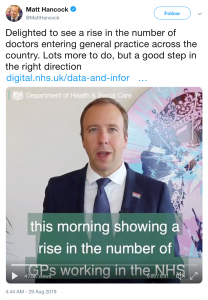At the end of August health secretary Hancock loudly proclaimed a rise in the number of GPs, but this is contrary to official figures which chart a clear decline in the number of family doctors over the last year.
“’There’s hundreds more GPs… we’re moving in the right direction”, said Hancock in a video posted on Twitter.
Statistics from NHS Digital show that the number of full-time equivalent GPs has fallen by 576 over the past year, from 28,833 in June 2018 to 28,257 in June 2019.
Hancock’s claim appears to be based on the total headcount of GPs which has increased by 2.7% but many of these doctors are part-time. The numbers could also have been inflated by a rise in the number of trainees.
The standard way to compare is to count the number of full-time equivalent staff and using this measure the fall in GP numbers in the last year is clear.

The reality according to recent research is that GPs are dangerously overworked. Half of GPs are working beyond safe limits, on average completing 11-hour days and dealing with a third more patients than they should be. (Pulse survey of 1600 GPs.
The poll also discovered that, on average, each GP dealt with 41 patients per day. 10% say they deal with 60 or more patients a day, when evidence from European research shows that 25 consultations in a day should be considered a safe limit.
The long-term trend is no better, the number of GPs has fallen by 1300 since 2015, whilst the number of patients has risen by 1.4m, increasing the number of patients per GP by 8%.
All this explains why many of us are finding it hard to get a GP appointment. One in five patients now has to wait at least 15 days to see a GP in England, NHS figures have revealed.
The Conservatives have ramped up expectations with an election promise to recruit 6000 new GPs, but as the Lowdown reports on its front page, this comes after years of failed attempts to meet a target of 5000 extra.
This year new GP training places have been filled, but the tough working conditions are driving existing GPs to retire or switch to other jobs.
Research by Warwick University found that over 40% intend to leave general practice within the next five years, an increase of nearly a third since 2014.
It takes at least 10 years to train a family doctor from entering medical school, so for the situation to improve more existing GPs must be encouraged to stay in the profession.
‘There is a point where I feel cognitively drained; after about 20 patients, there is not an iota of empathy left.’ – An overworked Hertfordshire GP
Dear Reader,
If you like our content please support our campaigning journalism to protect health care for all.
Our goal is to inform people, hold our politicians to account and help to build change through evidence based ideas.
Everyone should have access to comprehensive healthcare, but our NHS needs support. You can help us to continue to counter bad policy, battle neglect of the NHS and correct dangerous mis-infomation.
Supporters of the NHS are crucial in sustaining our health service and with your help we will be able to engage more people in securing its future.
Please donate to help support our campaigning NHS research and journalism.


